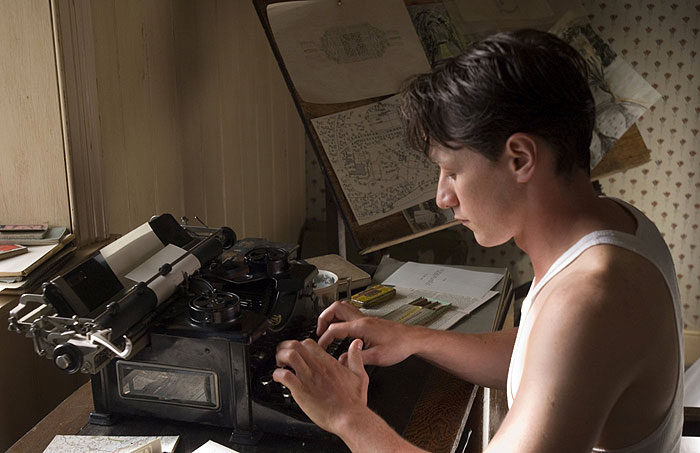JORDAN THOMASDescribed by event director Susan Beckett before the screenings began as an “informal, relaxed exhibition space for local filmmakers”, City Eye Cinema is an opportunity for amateur and professional filmmakers alike to screen their work in front of a live audience and receive feedback. Taking place at regular intervals throughout the year in a variety of alternative venues, this Southampton Film Week edition was held at The Stage Door, a quirky fringe theatre lined with cabaret posters and velvet furnishings, adding to the bohemian stylings of the event.
City Eye Cinema functions as an unconventional exhibition space, with the event showcasing three vastly different short films: Paul Vernon’s ambitious western Vengeance is the Lord, music video Mistletoe Bride by Rakesh Thind and Phil Peel’s anti-rom-com Chasing Fame. After each film was screened a member of the creative team provided some insight into the production of their short film. Most questions from the audience focused on location scouting due to the international flare of the shorts, featuring scenes set in Toronto, Arizona, Edinburgh and, most importantly of course, Southampton. The event was a unique chance to learn about the production of shorts directly from their creators and future City Eye Cinema events should not be missed. City Eye Cinema took place on Sunday 6 November as part of Southampton Film Week 2016.
0 Comments
You've chosen which film or television programme you will be reviewing. You've watched it, repeatedly, and made lots of notes. You've done your research. All that's left is to write your review!
Every review is different and there are no hard and fast rules about what should go into your review - otherwise every review of a film would be the same! However, there is a general structure that many good reviews follow: Introduction / ideally this should prodive a “hook” to pull the reader in and some introductory content to set the scene for your review/basic info such as director, writer, stars, genre. Previous work to note? There should already be a sense of your evaluation of the film. Synopsis / many readers may not have seen the film so this should be succinct without spoiling the viewing for others. Avoid spoilers at all costs! Description / more detailed than the synopsis, this is more about *your* experience of watching the film and what stands out in particular. Use this to set up what will be your main analysis of the most significant elements. This step might be woven in with your synopsis and analysis. Analysis / this is the main body of the review where you focus on the most significant elements of the film based on your consideration of formal techniques and thematic elements. The general rule of thumb for writing about film is to start with what is presented, then consider how it is presented, why is it presented in that way, then finally what is the effect of presenting it in that way. Aim to express three of four areas you think are most significant and use those areas to structure your analysis (e.g. one paragraph per area). Conclusion / bring your analysis to a close. What is your overall impression of the film? Is there an overriding reason why viewers should watch/not watch it? You might want to also bring in how else the film has been reviewed/received or note any awards etc. It is less than 2 weeks until the deadline for our Southampton Film Week writing competition and if you're not scribbling away already perhaps one of these films can inspire you. These are 12 of our favourite films that feature flashbacks as a storytelling device. We won't spoil the films by telling you anything about the flashbacks though. You will have to watch them to find out! Thinking about reviewing a film or TV programme about memory loss or amnesia for our Southampton Film Week writing competition? Here are some of our favourites. How many have you seen? |
Archives
December 2019
Categories
All
|



 RSS Feed
RSS Feed
